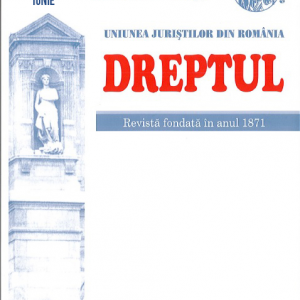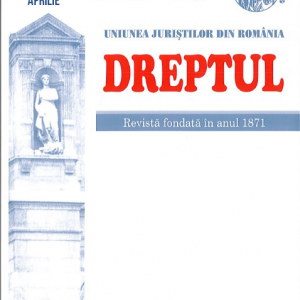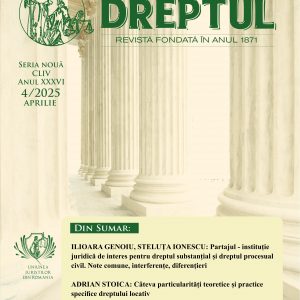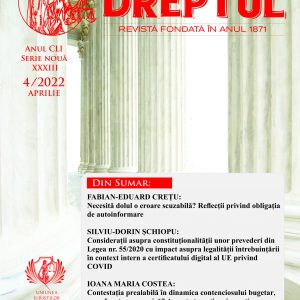-
 Given the overwhelming importance of the family home in family economic relationships, the Civil Code authors found it necessary to establish, as an absolute novelty, a special legal regime for various legal acts of the spouses in relation to this house and furnishing or garnishing property thereof. Also, the Civil Code provides a regulation derogating from the common law regarding the rights of spouses on the rented house and in connection with the award of the lease benefit and joint ownership of the house in case of divorce. The new regulations are designed to eliminate, mainly, the causes for various doctrinal interpretations and non-unitary jurisprudential solutions generated by the ambiguities and gaps of previous legislation in the matter.
Given the overwhelming importance of the family home in family economic relationships, the Civil Code authors found it necessary to establish, as an absolute novelty, a special legal regime for various legal acts of the spouses in relation to this house and furnishing or garnishing property thereof. Also, the Civil Code provides a regulation derogating from the common law regarding the rights of spouses on the rented house and in connection with the award of the lease benefit and joint ownership of the house in case of divorce. The new regulations are designed to eliminate, mainly, the causes for various doctrinal interpretations and non-unitary jurisprudential solutions generated by the ambiguities and gaps of previous legislation in the matter. -
 Through its varied meanings, “loyalty” is perhaps the noblest moral value. It is, in terms of law, a factor and a marker of legal relationships “moralization”, procedural relations including. Although unanimously accredited in the field legal relationships as well, including procedural relations, the loyalty principle is enshrined in terminis as a fundamental principle of civil proceedings. However, it is an implicit result of numerous provisions in the law of civil procedure, which finds appropriate forms of legal and judicial sanction. In our procedural civil regulatory climate, certain peremptory procedural exceptions having permanent effect make unnecessary the application of the praetorian “estoppel” rule established in common law and subsequently in other legal systems. Fundamental right of access to justice is not incompatible with assuming „duty of loyalty”.
Through its varied meanings, “loyalty” is perhaps the noblest moral value. It is, in terms of law, a factor and a marker of legal relationships “moralization”, procedural relations including. Although unanimously accredited in the field legal relationships as well, including procedural relations, the loyalty principle is enshrined in terminis as a fundamental principle of civil proceedings. However, it is an implicit result of numerous provisions in the law of civil procedure, which finds appropriate forms of legal and judicial sanction. In our procedural civil regulatory climate, certain peremptory procedural exceptions having permanent effect make unnecessary the application of the praetorian “estoppel” rule established in common law and subsequently in other legal systems. Fundamental right of access to justice is not incompatible with assuming „duty of loyalty”. -
 The author provides a detailed analysis of the legal content of bribe taking offense provided for in art. 289 of the new Criminal Code. He examines the subject of care proceedings, the subjects of the offense, the objective and subjective sides, the forms, procedures, sanctions and some procedural aspects relating to the deed provided for in art. 289 of the new Criminal Code and its aggravated versions. Also, the author does not hesitate to express his standpoint with regard to the systematization of this offense, the constituent content thereof, its nature, its relations with the provisions of Law no. 78/2000 on preventing, discovering and sanctioning corruption, as subsequently amended and supplemented, and to propose some of his own solutions and ideas in this regard. Not least, the author promotes some of his own opinions on the connection or relationship of this criminal deed with other offenses, as well as regards the law applicable for transitional cases.
The author provides a detailed analysis of the legal content of bribe taking offense provided for in art. 289 of the new Criminal Code. He examines the subject of care proceedings, the subjects of the offense, the objective and subjective sides, the forms, procedures, sanctions and some procedural aspects relating to the deed provided for in art. 289 of the new Criminal Code and its aggravated versions. Also, the author does not hesitate to express his standpoint with regard to the systematization of this offense, the constituent content thereof, its nature, its relations with the provisions of Law no. 78/2000 on preventing, discovering and sanctioning corruption, as subsequently amended and supplemented, and to propose some of his own solutions and ideas in this regard. Not least, the author promotes some of his own opinions on the connection or relationship of this criminal deed with other offenses, as well as regards the law applicable for transitional cases. -

-
 Prevention and fight against cross-border offences specific to organized crime shall be a major aim assumed by the European Union, an aim which has become imperative in time because of the proliferation of criminality in the matter and implicitly of the high degree of social danger of these categories of criminal offences. The study exposes a comparative analysis of the European Framework normative act, as compared to the provisions contained in the national internal laws, the author revealing that the Romanian criminal law is present interest, and in these circumstances the Romanian legislator shall not operate any amendments for the transposition of this normative act in the Romanian law. Beforehand, this subject represented the subject matter of certain different investigations in the field of judicial cooperation in the criminal matter among the Member States, concretized in studies and items published in specialty journals or international conferences, where the need for the harmonization of laws was pointed out among the Member States. Likewise, this study exposes also certain critical remarks related to certain rules contained in the European normative act, which, according to the author’s opinion, should be supplemented. Finally, this study is distinguished both by the comparative examination of the Council Framework Decision 2008/841/ JHA of 24 October 2008, with the provisions of the national internal law, and by the critical formulated remarks.
Prevention and fight against cross-border offences specific to organized crime shall be a major aim assumed by the European Union, an aim which has become imperative in time because of the proliferation of criminality in the matter and implicitly of the high degree of social danger of these categories of criminal offences. The study exposes a comparative analysis of the European Framework normative act, as compared to the provisions contained in the national internal laws, the author revealing that the Romanian criminal law is present interest, and in these circumstances the Romanian legislator shall not operate any amendments for the transposition of this normative act in the Romanian law. Beforehand, this subject represented the subject matter of certain different investigations in the field of judicial cooperation in the criminal matter among the Member States, concretized in studies and items published in specialty journals or international conferences, where the need for the harmonization of laws was pointed out among the Member States. Likewise, this study exposes also certain critical remarks related to certain rules contained in the European normative act, which, according to the author’s opinion, should be supplemented. Finally, this study is distinguished both by the comparative examination of the Council Framework Decision 2008/841/ JHA of 24 October 2008, with the provisions of the national internal law, and by the critical formulated remarks. -

-

-
 Audit services is based on two premises: (i) companies must be able to choose their auditors according to their needs and at a reasonable cost and (ii) investors must be able to rely on an independent audit opinion based on an audit of high quality before investing in a company. It is in the public interest to ensure a sustainable audit function and, consequently, a competitive market for audit firms. Usually, a person invests in a company only once, in advance, has analyzed an audit report relating to the financial condition of that company. If, then, there is a failure of the enterprise (such as eg bankruptcy) that has earlier cases and unidentified audited by the auditor in place its civil liability issue. The question is to set a limit on the civil liability of auditors so that, on the one hand, to ensure fair compensation to those injured (investors), and on the other hand, auditors to take such risks reasonably.
Audit services is based on two premises: (i) companies must be able to choose their auditors according to their needs and at a reasonable cost and (ii) investors must be able to rely on an independent audit opinion based on an audit of high quality before investing in a company. It is in the public interest to ensure a sustainable audit function and, consequently, a competitive market for audit firms. Usually, a person invests in a company only once, in advance, has analyzed an audit report relating to the financial condition of that company. If, then, there is a failure of the enterprise (such as eg bankruptcy) that has earlier cases and unidentified audited by the auditor in place its civil liability issue. The question is to set a limit on the civil liability of auditors so that, on the one hand, to ensure fair compensation to those injured (investors), and on the other hand, auditors to take such risks reasonably. -
 The authors argue that, exceptionally, the court (Pitesti Appellate Court) may postpone temporarily surrender of the person sought under a European arrest warrant, on the grounds of the need for care of minor children in charge of the person sought.
The authors argue that, exceptionally, the court (Pitesti Appellate Court) may postpone temporarily surrender of the person sought under a European arrest warrant, on the grounds of the need for care of minor children in charge of the person sought. -
 Potrivit art. 598 alin. (1) lit. c) C.pr.pen., contestația împotriva executării hotărârii penale se poate face când se ivește vreo nelămurire cu privire la hotărârea care se execută sau vreo împiedicare la executare
Potrivit art. 598 alin. (1) lit. c) C.pr.pen., contestația împotriva executării hotărârii penale se poate face când se ivește vreo nelămurire cu privire la hotărârea care se execută sau vreo împiedicare la executare -
 Undoubtedly, the most frequent contract used in practice is the sale and purchase contract, through which the alienation and acquisition of the property right and of other real rights is achieved, outlining the essential instrument through which the legal circulation of goods is carried out. The consent gives expression and materialization to the free will of the individual to contract and pre-contract, to assume a series of rights and obligations, to enter into legal relations. In this context, encountered with a special frequency in the current socio-economic reality – the preparatory agreements, as anticipatory manifestations of the consent in the matter of the sale and purchase contract, involve the same rigour of the conditions necessary for the valid existence of the consent. In all cases, what brings all these legal figures together into the patterns of a single legal institution is the main purpose pursued by the parties or at least by one of them, the one to enter, in the future, into a contractual legal relationship that gives full sati sfaction to the interest shown. As a consequence, the expression of the agreement of will determined by consent has known a double externalization, first through the previous form – the pre-contract – and subsequently through the contract itself. These two different moments, the period between them and the way in which they are legally related reflect some particularities and issues worth to be analysed in the broad spectrum of legal relations between persons.
Undoubtedly, the most frequent contract used in practice is the sale and purchase contract, through which the alienation and acquisition of the property right and of other real rights is achieved, outlining the essential instrument through which the legal circulation of goods is carried out. The consent gives expression and materialization to the free will of the individual to contract and pre-contract, to assume a series of rights and obligations, to enter into legal relations. In this context, encountered with a special frequency in the current socio-economic reality – the preparatory agreements, as anticipatory manifestations of the consent in the matter of the sale and purchase contract, involve the same rigour of the conditions necessary for the valid existence of the consent. In all cases, what brings all these legal figures together into the patterns of a single legal institution is the main purpose pursued by the parties or at least by one of them, the one to enter, in the future, into a contractual legal relationship that gives full sati sfaction to the interest shown. As a consequence, the expression of the agreement of will determined by consent has known a double externalization, first through the previous form – the pre-contract – and subsequently through the contract itself. These two different moments, the period between them and the way in which they are legally related reflect some particularities and issues worth to be analysed in the broad spectrum of legal relations between persons. -
 The most striking word that illustrates the relationship between Romanian law and European law seems to be the word „marking”. Among the various nuances that can be assigned to the meaning of this word, three meanings are relevant from the perspective of the topic addressed by this paper. Thus, among others, to mark means (i) to influence in a significant way, or (ii) to bear a mark that illustrates a membership, or more precisely (iii) to change a destiny. All of these nuances are defining in order to describe the decisive and irreversible „imprint” that European law has made, is making and will make on our domestic law. Through this scientific approach we have set out to address the implications of this complex structure which involves a multidimensional union that includes elements of supranational law, following the paradigm of the interference. The example that we will focus on is the area of consumer protection, where we will also address issues regarding constitutionality in relation to domestic law, but especially in relation to European law. We will consider both the past and the future, but, naturally, we will focus our attention on the present. In the context of the current COVID-19 pandemic, while not focusing on any medical or health matters related to the pandemic, but rather on its ties with the emergence of a new global economic, financial and banking crisis, we will address the link between European Union law and domestic law.
The most striking word that illustrates the relationship between Romanian law and European law seems to be the word „marking”. Among the various nuances that can be assigned to the meaning of this word, three meanings are relevant from the perspective of the topic addressed by this paper. Thus, among others, to mark means (i) to influence in a significant way, or (ii) to bear a mark that illustrates a membership, or more precisely (iii) to change a destiny. All of these nuances are defining in order to describe the decisive and irreversible „imprint” that European law has made, is making and will make on our domestic law. Through this scientific approach we have set out to address the implications of this complex structure which involves a multidimensional union that includes elements of supranational law, following the paradigm of the interference. The example that we will focus on is the area of consumer protection, where we will also address issues regarding constitutionality in relation to domestic law, but especially in relation to European law. We will consider both the past and the future, but, naturally, we will focus our attention on the present. In the context of the current COVID-19 pandemic, while not focusing on any medical or health matters related to the pandemic, but rather on its ties with the emergence of a new global economic, financial and banking crisis, we will address the link between European Union law and domestic law.
